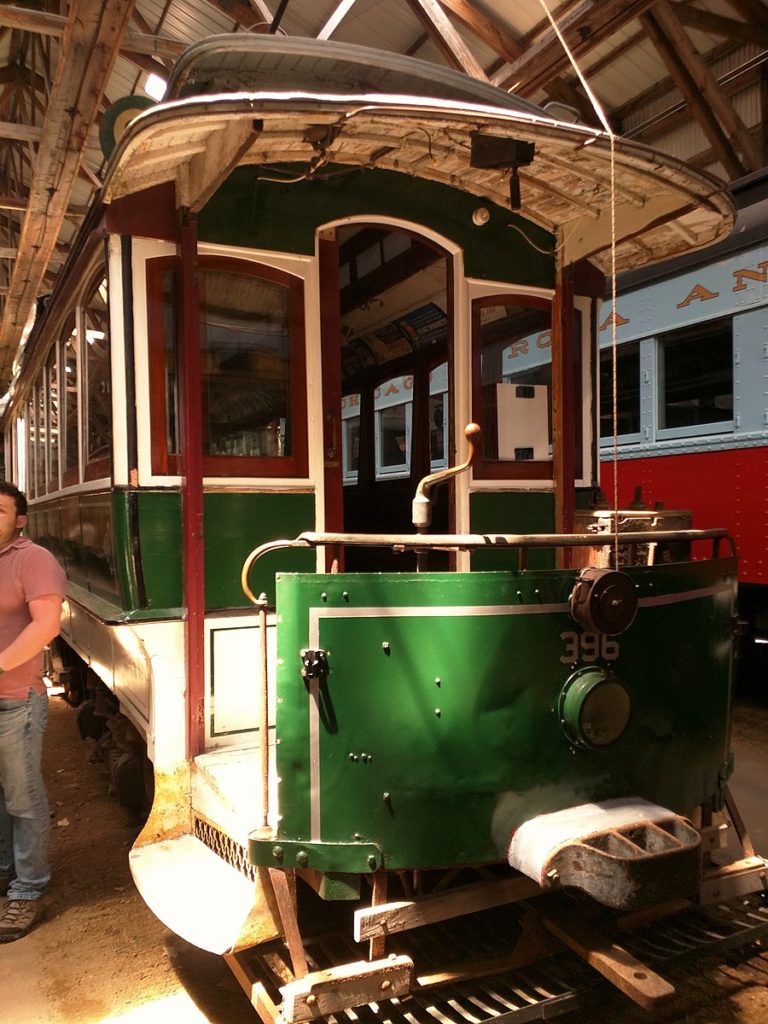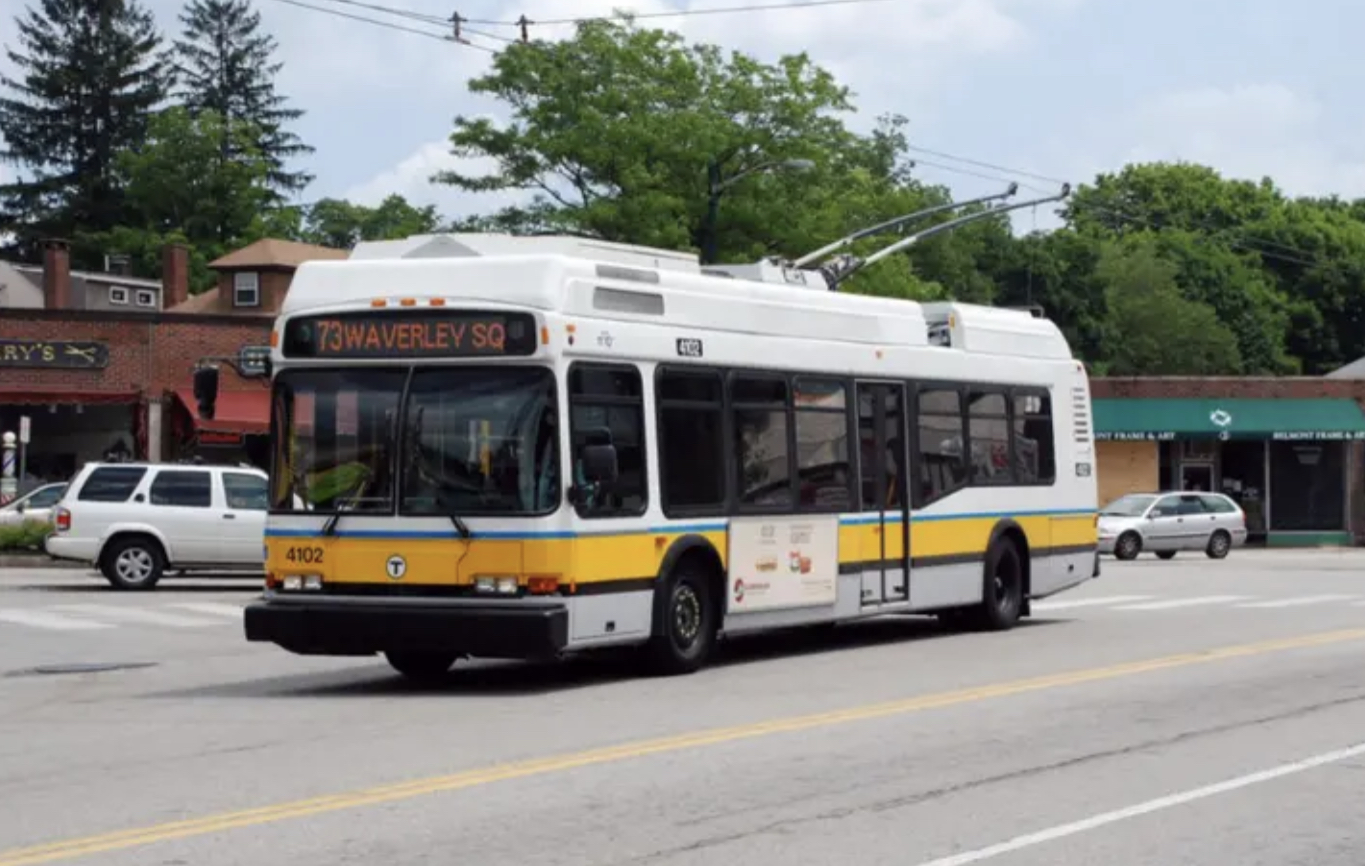Photo: Goodbye, old friend: The trackless trolley will run for the final time in March.
One of Belmont’s most notable features, the MBTA’s trackless trolley with the accompanying electric wires running nearly the entire length of the town along Belmont Street and Trapelo Road, will be coming to an end in March after more than 60 years in service.
As part of the MBTA’s modernization plan for bus travel, the heavily-used 73 bus line from Harvard to Waverley squares will be serviced by a fleet of new electric-powered buses that will be recharged at the T’s bus service facility in North Cambridge thus making the overhead cables obsolete, said Patrice Garvin, town administrator in a report to the Select Board on Monday, Jan. 24.
The town was notified last week the final trackless trolley trip will travel through Belmont sometime in March, said Garvin.
But until the MBTA completes a two-year refitting of its facility to allow for recharging to take place, Belmont commuters and travelers will be hopping on the authority’s diesel buses, similar to those running on the 75 line from Harvard Square to Belmont Center. At that time, the cables will be removed.
”So [the MBTA is] saying they’re gonna take down the electric wires that run the electric buses to run diesel buses to convert to electric buses which makes zero sense. Welcome to the MBTA,” said Board Chair Adam Dash.
While Dash noted any work to remove the cables will be “massively disruptive” for residents, Community Development Director Glenn Clancy said with his experience with the MBTA on the Trapelo Road Reconstruction project, it’s likely that work will be done at night when volumes are down.
The trackless trolley – a bus retrofitted to use the overhead cables – replaced the historic streetcars in the 1940s that ran on rail tracks along the same route for nearly 75 years. The rails were never removed and lie under the blacktop along the route.
A history of the trackless trolley era in and around Boston – with several mentions of Belmont – can be found on the Boston Streetcars website.









Also remember that this fleet of Neoplan trolleybuses has/had at least 5 more years of service life remaining.
Compared to the previous two fleets of Flyer and Pullman tracklesses that lasted 30+ years and 28 years respectively, this is a pretty lousy waste of a very useful asset with no pollution.
Diesel fuel just topped $5.00/gallon. Smooth move MBTA!
This is just about the dumbest thing that can be done. What is the issue with the overhead wires? Batteries cost to buy, cost to dispose of, may have issues with charging, etc. etc. Costing more for the tax-payers of Belmont.
The overhead electric lines are clean, and have been working for 60+ years.
How do you spell stupid? MBTA
The termination of electric trackless trolley service to Waverley Square is lunacy. The entire overhead catenary system is brand new, having been totally rebuilt in 2016 at a cost of several million dollars. To trash this infrastructure after only five tears of use is typical of a transit agency that cries poverty while wasting tax dollars. Added to the lunacy of the termination is the fact that replacement buses will still require diesel fuel. The hybrids slated for the initial replacement service until 2024 and the electric battery buses both will continue to use diesel. Touting the electric battery buses as 100% electric is false. The battery buses will have a diesel motor to fuel both the heating and air conditioning systems because the battery is not powerful enough to assure warm buses in the winter and cool ones in the summer. The only electric buses that are totally pollution free at the source are electric trackless trolleys. Finally, continuing the operation of so many other bus routes, all of them in fact except the #71, fueled by heavy diesel and natural gas while terminating the only electric service that already exists adds again to the lunacy that is the MBTA.
Leave the wires up and continue running the trolley buses, don’t turn back to diesel buses they pollute the air why do that ? keep the trolley buses running and leave those wires up even with the new battery buses, if there is any major problems with the charging stations or the battery’s themselves you can always go back to the trolley buses. Listen to the people for a change.
Rechargeable battery buses are in no way a proper replacement for trolleybuses – they have trouble coping with extreme cold and heat, they consume much more energy being much heavier due to their batteries, and have severe limitations on range, requiring downtimes for recharging thus purchase of more vehicles, resulting in less reliable and more expensive operation. Plus, the current generation of new trolleybuses requires wires only on 30-50% of the route length, due to small batteries allowing them to run off-wire for up to 15 miles, and then recharge while running under wire. This allows to electrify a whole bunch of bus lines with wires in place in one corridor such as Belmont, without the backdrops of rechargeable buses.
At a time where cities like Berlin, Zurich, Prague or many others are either building new trolleybus systems or expanding those in existence, the proposal to take down the wires is not understandable. Replacing a zero-emission mode with diesel buses seems a strange decision giving the constraints climate change imposes on us.
From the International Association of Public Transport UITP, Trolleybus Committee, we suggest to keep the wires up for the time being, despite the road works, to allow for a holistic planning for the Boston area, including a solution with scale effects for both the Cambridge and Boston side trolleybus networks. Current-generation trolleybuses can deviate from wires thus cope with roadworks, so an advanced trolleybus fleet renewal would be the economically and ecologically more viable decision to cope with the planned works.
Leave the overhead wires and run the electric buses until the new line is open, WHY IN HELL ARE YOU SUBJECTING RESIDENTS TO THE SMELLY DIESEL BUSES when you STILL have these trolley buses ? aren’t you people using your brains God gave you ? WAIT UNTIL THE EQUIPMENT IS READY THEN CONVERT OVER LEAVE THE PEOPLE ENJOY THE TRACKLESS TROLLEYS.
This is very sad!
Some cities, most notably Toronto, have been victims of a switch in that they were promised a low-pollution replacement for their trolley buses, the wires were taken down, and then the new alternative proved impractical and so the temporary Diesels remained as permanent.
Trackless trolleys were not ‘retrofitted. They were built that way from the start.
This really makes no sense. Overhead catenary electric is way more efficient than battery powered buses even with rubber tires. There is a 30% loss in recharging batteries. Better to put renewables to power the overhed catenary and convert rubber tired trolleys to steel on steel restoring the buried steel tracks. Worse yet is the conversion to dirty diesel buses for at least 2 year…
https://commonwealthmagazine.org/opinion/mbta-has-a-bad-plan-for-electrification/
This is so incredibly boneheaded. Overhead wires are superior for frequent routes, and can also be used to charge batteries for small off-wire segments. It is frustrating to see the MBTA repeating the same regretted mistakes as other agencies, as if it will play out any differently here. This is a step backwards.